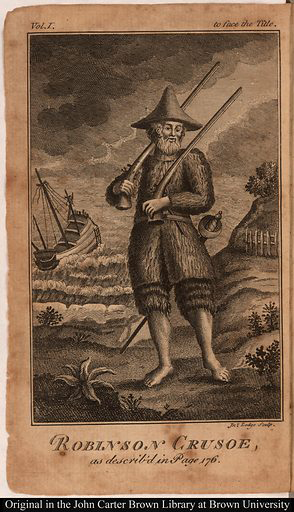
Most of us have seen one of the diverse movie versions of the book Robinson Crusoe, the story about a malcontent castaway who is seemingly impatient with life.
From viewing the many depictions of Robinson Crusoe, whether in film or animation, we may think we know what author Daniel Defoe is trying to tell us.
However, there is no way to truly understand the phenomenon of Robinson Crusoe, unless one reads the unabridged edition of this classic.
It is about more than just one man’s misadventures on the open sea; exploring other countries, being kidnapped by pirates, forced into servitude, rescued, and shipwrecked. Or, being marooned for 28 years on a remote island where he saves the “savage,” his man Friday, from cannibals in the Caribbean.
This is a story about redemption and self-reflection something we all must ultimately confront with courage.
When Crusoe realizes the dire urgency and hopelessness of his circumstances, he contemplates a dark thought:
“I had great reason to consider it as a determination of Heaven, that in this desolate place and in this desolate manner I should end my life…”
Too many men have settled on the finality of this sentiment.
Through overcoming and abandoning this fleeting proposition, Defoe delves into the story of a man who is compelled to use vigilant introspection to assess what trajectory has led to the calamity in his life.
Crusoe arrives at the conclusion that his folly is his own doing.
In the beginning of the book, Crusoe defies his father who pleads with him to not go to sea. His father argues that only men of little means and no clear path in life embark on adventures at sea.
“I was sincerely affected by this discourse, as indeed who could be otherwise? And I resolv’d not to think of going abroad any more, but to settle at home according to my father’s desire. But alas! A few days wore it all off; and in short, to prevent any of my father’s further importunities, in a few weeks after, I resolv’d to run quite away from him.”
And, so he did. Who has not done nearly the same, only to end up in some ominous situation? Does this sound familiar? For those who are imprisoned, consider Crusoe’s thoughts on how “…we never see the true state of our condition till it is illustrated to us by its contraries, nor know how to value what we enjoy, but by want of it.” Think freedom.
Here is where I draw a direct correlation to Crusoe’s sea adventures and the hazards involved with criminal undertakings: The end result of both, in this instance, leads to the same outcome: banishment and isolation from society.
After evaluating what led to his undoing, and questioning why he has been forsaken, Crusoe jettisons his self-pity; realizing that he should be thankful his life was spared, and that it still has purpose.
“Upon the whole, here was an undoubted testimony, that there was scarce any condition in the world so miserable, but there was something negative or something positive to be thankful for in it; and let this stand as a direction from the experience of the most miserable of all conditions in this world, that we may always find in it something to comfort our selves…”
Here, survival dictates resourcefulness, similar to what many castaways in prison embody. When a man is stripped of his best and his worst, something else remains: regret, penitence, hope, and the possibility for change.
Contemplating life and the bleak outlook on his future, Crusoe reasons: “I learn’d to look more upon the bright side of my condition, and less upon the dark side, and to consider what I enjoyed rather than what I wanted…”
One man’s triumph over nature and the fell of a clutch circumstance should be an inspiration to the 1.9 million men, women and children currently locked away in America’s penal colonies facing their own Defoe epic.
As Crusoe aptly observed during his solitary state, people “cannot enjoy comfortably what God has given them; because they see and covet something that He has not given them.”
This dooming reality has led to the demise of countless men since time immemorial. It is a tough lesson on how and why we should learn to live with gratitude, humility, contrition, and restorative justice. Like Robinson Crusoe, it’s how we start over.